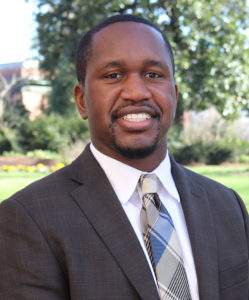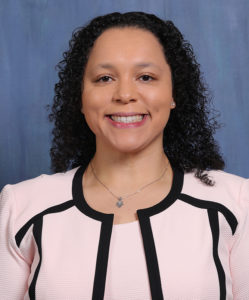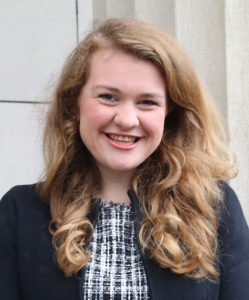Christopher Brock: Inspiring others to be successful
 Recent graduate Christopher Brock has had several mentors who helped him on his path to law school.
Recent graduate Christopher Brock has had several mentors who helped him on his path to law school.
After growing up in Lawrenceville, Georgia, Brock attended Georgia Southern University majoring in psychology with a minor in criminal justice. While there, he received an opportunity through a friend to work as a court appointed special advocate for the Ogeechee Judicial Circuit, where he advocated for foster children in the juvenile court system.
“It is easier to build strong children than to repair broken men,” Brock said. “It reminded me of when I was in high school when I served as a peer mentor. I enjoyed [working with children] and making sure that I could communicate what they needed to the judge and other adults in a position to help. Being in that atmosphere and seeing how attorneys were doing their job piqued my curiosity about law school.”
After graduating, Brock worked as an administrative assistant for attorney Francys Johnson (J.D.’04), who encouraged him to apply to UGA, which Brock said he had never thought about. “I thought UGA was out of my league but [Johnson] said ‘no, apply and go visit,’” he said.
“I participated in a few pre-law scholars’ programs in Atlanta with Eversheds Sutherland and Kilpatrick Townsend to get an understanding of how to best adapt to the structure of law school. At the Kilpatrick Townsend AT&T Legal Scholars program, I met Dean Rutledge and he told me to apply and find a mentor,” he continued. “Later on, I came to visit the school and, once I saw it, that’s when I started to feel a little more comfortable about being here.”
Brock was accepted to UGA and named the inaugural Be Kind Scholar. The Be Kind Fund memorializes the late Georgia Supreme Court Chief Justice P. Harris Hines, who passed away in 2018.
“I definitely have enjoyed law school,” he said. “You never look at the world in the same way. It’s taught me how to think. It’s taught me how to problem-solve and, of course, my writing has really taken on a life of its own. I think overall my law school experience has been great. The thing about UGA Law is it’s a big school but it’s a small feel. We all want to see each other succeed which makes the rigor of law school less stressful and more motivating.”
In law school, Brock co-founded the Privacy, Security and Technology Law Society, and he was a member of the Davenport-Benham Chapter of the Black Law Students Association and served on the national BLSA executive board. Brock was also the Bible study chair for the Christian Legal Society and participated in the school’s Business Law Clinic.
In 2020, he held his first summer position with U.S. District Court Judge Steve C. Jones (J.D.’87). “He has so much knowledge and Judge Jones is the nicest person you’ll ever meet,” Brock said. “It was so good I went back to work with him twice.”
Throughout law school, Brock has received support from his family. “I cannot count all the ways my parents have supported me. Having a support system like that in law school is so important.”
He also has an aunt who attended law school and has been a mentor and counselor to him. “Those three have taught me so much about being a professional, studying hard and using your skills to serve your community while doing what makes you happy,” he said.
With his law degree in hand, Brock is working for Miller Martin in Atlanta in the areas of government relations and commercial real estate. His dream is to be a Supreme Court justice.
“I hope to be a reflection of kindness to others and that you can be anything you want to and that there are people in the world who are willing to help you get there,” he said.
Molly Laughlin: Taking things as they come
 Rising third-year student Molly Laughlin has always felt “that things happen as they are supposed to happen.”
Rising third-year student Molly Laughlin has always felt “that things happen as they are supposed to happen.”
After this first-generation college graduate completed her bachelor’s degree and her Master in Public Administration at Georgia Southern University in four years, the timing was right. Georgia was establishing accountability courts, and Laughlin landed the inaugural coordinator position for the Felony Drug Court in the Enotah Judicial Circuit.
Describing the time as exciting, she said, “We went from starting a brand-new program to quickly becoming one of the top 10 programs.” In 2017, she was selected from among her 1,500 colleagues statewide to receive the Tommy Day Wilcox Leadership Award for her efforts.
She said her work was meaningful, adding it was not just the 250 people she helped graduate from the accountability program but their families were affected as well. “People often feel so broken. It was amazing to see the transformation they made with help and someone to treat them with empathy. I think we often lose that sense of humanity as we get so busy.”
Laughlin soon found herself wanting to do more. “I could help my participants with the felony drug charges they were facing,” she said, “but I could not help them legitimize their children or represent them in a divorce.” Thus, pursuing a law degree became part of her future.
With scholarships to several law schools, Laughlin said she was very grateful to receive the AnBryce Distinguished Law Fellowship at UGA and that it made her choice easy as the fellowship covers her tuition and provides funding for public service work over the summers in addition to other opportunities.
She is very active in the school’s advocacy program and plans to participate in the Prosecutorial Justice Program this fall. She is also a member of the National Black Law Students Association’s Southern Journal of Policy and Justice and will serve as the first editor-in-chief of the law school’s newest journal – the Georgia Criminal Law Review.
Laughlin, who wears her late mother’s pearls during moot court and mock trial competitions, said she gets her advocacy skills from her dad and her passion from her mom. She also credits her dad with her outlook on life. “He teaches me how to get the most out of life and how to keep pushing even when it’s hard,” she said. “If I’m having a bad day, he encourages me not to focus on the negative and wake up ready to fight again the next day. I think that sense of purpose is what a lot of people are missing.”
As a stress reliever Laughlin and her fiancé, Austin Jackson (who is a lawyer in the Athens-Clarke County Attorney’s Office), operate their own baking business – Cakesmith. She said baking is something she looks forward to doing, and she joked about them being a power couple – in both baking and law.
In her “dream legal kingdom” – where there are no limitations – she would pick all of her cases and defend people who cannot afford an attorney. “I think many of us take for granted the fact that we know how to operate within the legal system. It is a luxury, especially to those who lack resources or knowledge – even something as simple as drafting a will or filing a medical malpractice claim is out of reach.”
Armed with the faith that things work out the way they are supposed to, Laughlin has her sights on making a difference and ultimately becoming a judge here in the Peach State. “If I am going to help anybody, if I am going to serve anybody, I want to do it in Georgia,” she said.
Ellie Williams: Turning a passion into a profession
 Ellie Williams knew from an early age that she wanted to help others, and the rising third-year student plans to use her law degree to do just that.
Ellie Williams knew from an early age that she wanted to help others, and the rising third-year student plans to use her law degree to do just that.
A native of Greenville, South Carolina, Williams began working with those in need while a teenager.
“In high school I started doing volunteer work with domestic violence survivors and I really developed a passion for the work,” she said. “Going into college I knew I wanted to be in a helping profession and I knew I probably wanted it to be with domestic and sexual violence survivors.”
After obtaining degrees in sociology and Spanish from Furman University, Williams moved to Nashville for two years, and she worked with a nonprofit agency and the state government.
“When I was working I was getting a certain amount of exposure to the court system,” she said. “I saw the J.D. gives you a lot of power to effect important change in individual outcomes and on a systemwide level.”
Williams decided to attend law school and, as she began researching her options, she focused on those that offered programs that would give her the opportunity to work with domestic violence survivors.
“I picked Georgia for several reasons. One being the [Jane W. Wilson Family Justice Clinic]; it was huge. The Wilbanks [Child Endangerment and Sexual Exploitation] Clinic also interested me,” she said. Noting the school also had the Public Interest Practicum, the Prosecutorial Justice Program and the Criminal Defense Practicum, she said, “Seeing this array of opportunities signaled to me this school’s commitment to public service. It sent a message to me that this is something Georgia values, which has proven true.”
Additionally, the law school’s affordable tuition was appealing as she was considering a career in public interest work. “Knowing it was a really affordable law school that would simultaneously provide a lot of options and good employment outcomes was a significant factor in my decision,” she added.
Williams was accepted to UGA and was awarded the Jane W. Wilson Distinguished Law Fellowship, which is a full-tuition-plus scholarship.
As a student, Williams has been involved in a variety of different learning opportunities, including the Wilson Family Justice Clinic and Criminal Defense Practicum, the school’s advocacy team and work as a research assistant. She is also a member of the Dean’s Ambassadors, and she has served as the senior managing editor of the Georgia Journal of International and Comparative Law.
Williams said that after graduation she hopes to pursue a career working with criminalized domestic violence survivors. In addition to her time in the classroom, she has been able to obtain summer employment to help hone specific skills to do such work.
During the 2021 summer, she worked with the Domestic Violence Legal Empowerment and Appeals Project in Washington, D.C., and this summer she took a position with the Georgia Innocence Project. Ultimately, Williams’ experiences at the School of Law will give her the tools she needs to continue the work she grew passionate about all those years ago.
“Being here feels like really launching on a trajectory of being able to make an impact for a lot of people, and seeing that play out in a practical sense in internships and clinics has been really meaningful,” she said.
